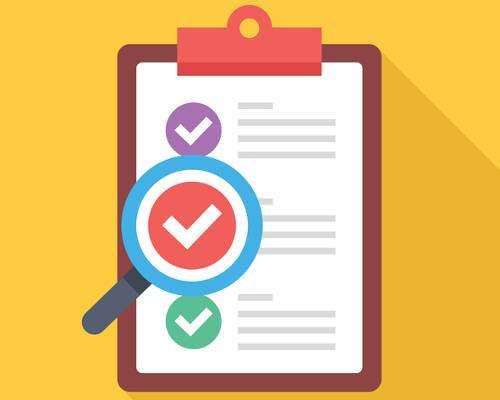Presentations can be complicated and stressful, no matter how well you prepare for them.
If your notes aren't organized, the slides aren't in order, or the equipment isn't ready, your presentation won't go as smoothly as you had hoped.
Organization is the key to a successful and smooth presentation, so you need to double check that everything is set up before your begin. Organizing your presentation and checking everything just before you're due to speak will ensure you can focus on the presentation and won't be interrupted, ro disracted by problems.

1. Prepare the content
Preparation is the key to a successful presentation, and it's the only way to ensure your content is right, the slides are well-designed, and your speech is ready. To ensure that your ideas are clear and materials are tailored,
create a document to organize the things you needed to have a smooth presentation.
The quality of your preparation will have a direct impact on the quality of how effective you are; so make sure you put a good amount of time and effort into it. The preparation process should include:
• Know your audience and their preferences.
• Thoroughly research your subject matter.
• Carefully select the slide design and presentation software.
• Carefully plan the written content.
• Proofread all written content thoroughly.
These are just some of the important steps you need to take in order to start off on the right foot when it comes to your presentation.
2. Prepare for the presentation
Once you've created all the content you need in order to convey your message, you need to prepare for the presentation itself.
This is the second most important step you need to take in order to ensure everything runs smoothly, and that you're relaxed during the session. Here are some of the things you need to do:
• Ask a friend, colleague or someone else to take a look. Make sure they're honest and unbiased so you can rely on what they say.
• Practice repeatedly until you can confidently deliver your speech without consulting your notes too often.
• Print out all the notes yourself so you have some reference point when you're making the presentation. It's necessary because you might still forget some lines and words. Or something else can go wrong (like a power failure...) which can disrupt the flow of the presentation and distract your audience. Quite apart from this, it also creates a very poor impression on those attending the meeting.
• Print handouts or arrange for digital copies for every person in the audience. They need something to refer to, whether it's when they're listing to your presentation, or afterwards.
• Make sure you're familiar with all the presentation software and equipment, so you don't need to struggle with it at the last moment when you're just about to give the speech.
3. Keep timing in mind
You need to keep your presentation informative, but also concise, because drawn-out presentations will often frustrate your audience. Here's what you can to do organize your time and help save time of your guests:
• Make sure you provide some new piece of information every minute. This will help you keep your speech short and informative and ensure your audience keeps their attention on you.
• Arrive early and supervise the set up. If you can, run a practice presentation before the audience arrives, which will help you settle down and ensure everything is in place.
• If you can't perform a test run, conduct one in private to ensure everything is in order and just as you need it to be.

If you'd like to learn more about delivering presentations, why not take a look at how we can help?
Boost your presentation skills with our online courses.
RRP from $65 – limited time offer just
$23.99
4. Double check your content right before the presentation
Double check your content before you're due to face your audience.
Check if you have enough hand-outs to for all the attendees, with no missing slides from the set, and your speech notes are organized and ready for the presentation.
This last minute checking will not only help you calm your nerves, but will ensure that everything is in place for the session. You' feel more relaxed and confident, which will have an impact on the quality of your presentation.
5. Question and answer sessions
The question and answer session is the least organized aspect of your presentation, because you have no control over what your audience will ask! So it's a good idea to prepare in advance anyway; here are some of the things you can do:
• Think of a number of questions they're likely to ask and prepare answers for them in advance. This will help you save some time - and be more confident when that questions start to flow!
• Set a limit to the number of questions you will answer, especially if you have a good rapport with your audience because it can be tempting to let the Q and A session drag on.
• Keep your answers short and to the point. Follow the same "one-minute per important information" rule so you don't let the session drag on for too long.
Provide attendees some way of contacting you afterwards in case they have more questions. You can give them your social handles or email address. This will help you shorten the session as well.
The consequences of not being organized
Lack of organization can cause
a number of problems, especially during big presentations with a large audience. Here are some of the most common problems caused by disorganization:
• Your slides and notes won't be in order and cause you confusion and stress during the presentation.
• Your audience will become bored or frustrated because your content will have no flow or proper direction.
• Some of your audience won't have access to handouts.
• The Q and A session will quickly get out of hand and cause delays - or maybe die on its feet.
• Your equipment and software might not work as you expect them to.

Organization will ease the burden on your shoulders and make it easier for you to deliver the presentation calmly and without making mistakes.
If you follow a step-by-step process and make sure every aspect is well-planned, you will have a successful presentation that your audience will appreciate and enjoy. In addition, when starting out, it's always a good idea to get some professional input, such as training, as then you develop good habits, right from the start!

If you'd like to learn more about delivering presentations, why not take a look at how we can help?
Boost your presentation skills with our online courses.
RRP from $65 – limited time offer just
$23.99




























